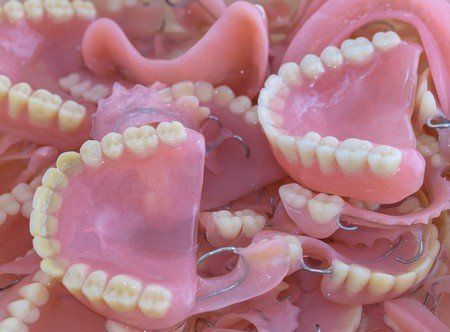How to Get Used to Dentures
For most dental patients who’ve just started wearing dentures, oral discomfort quickly becomes par for the course. However, while denture-related discomfort can become an issue for many, the act of adjusting to the new dentures and wearing them is of the utmost importance for one’s health. Luckily, it’s not necessary for you to sacrifice comfort just to have a great smile. To help you get adjusted to the new feelings and sensations brought on by your new dentures, here are a few tips to hopefully make the task a little easier.
Have Realistic Expectations
As with teenagers and braces, dentures can feel like foreign objects at first and even make you feel embarrassed while you learn how to eat and speak naturally while you’re wearing them. It’s also normal to feel some discomfort and shock while adjusting to everything, but it’s important to remember that this won't always be the case.
While growing accustomed to both eating and speaking, patience is the key. According to the ADA, it’s normal to experience slight soreness after you get new dentures. In the meantime, visiting with your dentist for readjustments can help with relieving some of the discomfort.
Also, you might consider taking your dentures out in four-hour intervals while your jaw and gums are still adjusting. However, don’t stop eating nutritious foods in favor of processed, more forgiving items in these early days. Chewing in smaller portions can help to make harder foods easier to bite into, but try starting with softer ones at first, working up toward harder items like apples or red meat.
Exercise Your Cheek Muscles
The buccinator muscles within the mouth can be found in the cheeks, which help to direct food as you’re preparing to swallow. As you do with any other part of your body, building up these muscles in the first couple of weeks or before getting dentures can provide more control of the foods you eat. If you keep experiencing cheek pain, this could also indicate you have ill-fitting dentures. If you suspect this to be the case, schedule an appointment with your dentist visit as soon as you can.
Experiment with Adhesives
If this interests you, consult your dentist or your prosthodontist in regard to the best dental adhesives and creams available currently, so you can experiment with the kind that works best for you. Small amounts can go a long way toward reducing early discomfort, but don’t pursue adhesives for ill-fitting dentures. Schedule a dental appointment if you suspect you need an adjustment of your dentures.
Follow the Post-Extraction Plan
An essential step to take while adjusting to dentures is sticking closely to your prescribed treatment plan. Every person heals at different rates, and your mouth is going to feel sore after an extraction. While it depends on whether you have partial or full dentures, you may take longer to feel at ease wearing dentures since they will grow to fit differently while your gum line shifts over time. With that in mind, taking prescribed medication while also attending appointments for necessary changes can greatly cut down on discomfort.
Are dentures something you are considering? Would you like to possibly save as much as 20 percent off your dental bills? Then you are going to want to check out our New Hampshire discount dental plan ! We have plans for individuals, families, and even small business owners. For more information, click here.
Copyright: bunwit
/ 123RF Stock Photo











